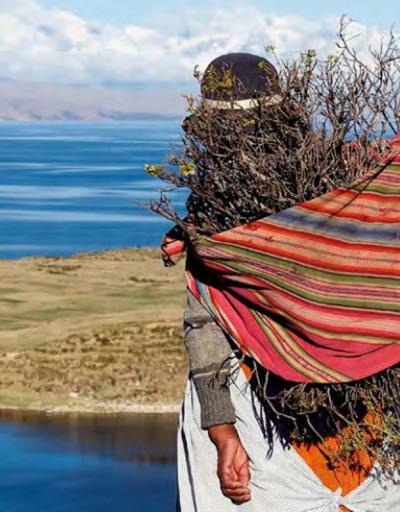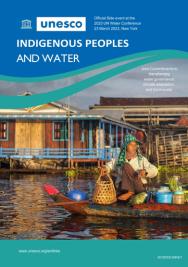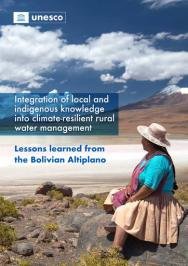
Water
UNESCO and Water Security: Achieving SDG 6 with UN Partners
UNESCO is one of the main UN Agencies engaged in water science, knowledge and policy issues. UNESCO’s Intergovernmental Hydrological Programme (IHP) enables all stakeholders to participate in the creation of a new, sustainable, water culture. IHP’s mandate is set according to the ninth phase (IHP-IX, 2022-2029) with a focus on Science for a Water Secure World in a Changing Environment.
In addition, in 2000, UNESCO established the World Water Assessment Programme (WWAP) as a response to a call from the UN Commission on Sustainable Development to produce a UN system-wide periodic global overview of the status (quantity and quality), use and management of freshwater resources.
UNESCO is a member of UN-Water, which is a coordination mechanism of some 30 different agencies. It is comprised of United Nations entities, called Members, and international organizations known as Partners working on water and sanitation issues.
In 2015, the UN General Assembly adopted the Sustainable Development Goals (SDGs), including SDG 6, which calls on UN Member states and partners to "Ensure availability and sustainable management of water and sanitation for all" by 2030. The goal is comprised of 8 specific targets, and progress is measured by monitoring 11 indicators.
Water in the UN Declaration on the Rights of Indigenous Peoples
Article 25 states: "Indigenous Peoples have the right to maintain and strengthen their distinctive spiritual relationship with their traditionally owned or otherwise occupied and used lands, territories, waters and coastal seas and other resources and to uphold their responsibilities to future generations in this regard."
See also Article 31: "1. Indigenous Peoples have the right to maintain, control, protect and develop their cultural heritage, traditional knowledge and traditional cultural expressions, as well as the manifestations of their sciences, technologies and cultures, including human and genetic resources, seeds, medicines, knowledge of the properties of fauna and flora, oral traditions, literatures, designs, sports and traditional games and visual and performing arts. They also have the right to maintain, control, protect and develop their intellectual property over such cultural heritage, traditional knowledge, and traditional cultural expressions.
2. In conjunction with Indigenous Peoples, States shall take effective measures to recognize and protect the exercise of these rights."
Water Action Decade
The International Decade for Action “Water for Sustainable Development” 2018-2028 was adopted by the UN General Assembly through resolution A/RES/71/222, as a means of coordinating UN agencies’ efforts and working towards international, regional and national coordination on water policy issues and averting a global water crisis. It is known as the Water Action Decade.
The United Nations 2023 Water Conference, organized on 22-27 March 2023, aimed to mobilize Member States, the UN system and stakeholders alike to get the world back on track for reaching the targets of Sustainable Development Goal 6 (SDG 6), to ensure access to water and sanitation for all by 2030. It provided a timely Midterm Comprehensive Review of Implementation of the UN Water Action Decade.
UNESCO-LINKS is working with UN partners, including the Food and Agriculture Organization (FAO), the Small Grants Programme (SGP) funded by the Global Environment Facility (GEF) and implemented by the United Nations Development Programme (UNDP), UNDP and the United Nations Environment Programme (UNEP) to support the participation of Indigenous Peoples and the sharing of Indigenous key messages and case studies of water management, governance and rights issues.
Dushanbe Water Action Declaration
In June 2023, the Second International High-Level Conference on the International Decade for Action “Water for Sustainable Development” 2018-2028 was hosted by Tajikistan in cooperation with the Netherlands. The Conference reviewed major themes on water, water science, energy and policy issues. Its Final Declaration “From Dushanbe 2022 to New York 2023” is a milestone in the water agenda, and highlights the importance of the participation of Indigenous Peoples and local communities. In the Declaration, high-level representatives of the states, organizations, major groups and other stakeholder reiterate their determination to achieve the objectives of the Water Action Decade and declare their commitment to:
Demonstrate and scale-up solutions that lead to action underpinned by science and technology innovations, including open and citizen science, women-led, youth-led initiatives, as well as traditional and Indigenous knowledge, to achieve more effective and climate-resilient water and sanitation management in line with national priorities and circumstances [...]
UNESCO-LINKS, in cooperation with UNDP Small Grants programme, the UNDP Water & Ocean Governance Programme, the FAO Indigenous Peoples’ unit, UNEP and the Stockholm International Water Institute, supported Indigenous Peoples and local communities to contribute to the first UN Forum on Indigenous Peoples and Local Communities on Water Action, held on 6 June 2022, prior to the Dushanbe 2nd High Level Water process.
Indigenous leaders from Africa, the Arctic, Asia, Latin America and the Caribbean resolved to create an informal reference group of Indigenous Peoples’ networks and organizations to work with the UN on water policy issues, including the Mid Term Review of the Water Action Decade.


The report focuses on the human rights to water and sanitation, and the 2030 Agenda for Sustainable Development.






